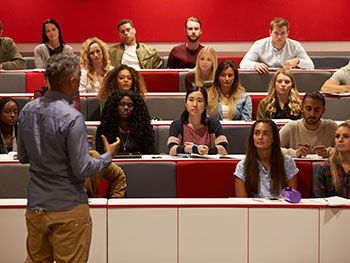University News Last updated 17 November 2017

A study conducted by academics at Birmingham City University has examined the experiences of university lecturers in relation to new duties imposed on public sector workers under the Counter-Terrorism and Security Act (CTSA) 2015.
Researchers Dr Keith Spiller, Dr Imran Awan and Dr Andrew Whiting found that the new CTSA imposes a sense of ambiguity around the specifics of the new public duties, claiming that the CTSA provides a questionable evidence base which could be dangerous as well as counter-productive.
The research report, entitled ‘What does Terrorism look like?’: University lecturers’ interpretations of their Prevent duties and tackling extremism in UK universities’, has been published in the Critical Studies on Terrorism journal this week, featuring details of the fear and anxiety surrounding academic freedom.
20 interviews were conducted with university lecturers at institutions across the UK, examining reactions of the academic community to the CTSA and the security roles mandated to public service workers.
The CTSA 2015 has identified 22 broad ranging criteria that may indicate a person’s likelihood to be drawn into terrorism and this is used as a framework to identify suspicious behaviours.
“There has been very little research conducted into the experiences of UK university lecturers in relation to this new public duty they have to undertake”, said Dr Awan, Associate Professor of Criminology at Birmingham City University.
Research participants disclosed how they felt nervous. One interviewee said: “How can we build trust with our students when the very thing we are doing will create suspicion and mistrust? I am genuinely not sure now whether someone wearing a headscarf or if someone having a beard should warrant me contacting the relevant services.”
Another participant said: “Staff are just simply not qualified to do this, academic staff are not psychologists or psychiatrists, they’re not counter-terrorist practitioners.”
Dr Spiller, Lecturer in Criminology at Birmingham City University, said: “This is important work, as here we have a mandate that is effectively deputising HEA staff - administrators, teachers and managers - to monitor their students against a framework that few feel is helpful and one that is difficult understand.”
Awan, Spiller and Whiting also applied for a Freedom of Information (FOI) request from the Home Office, in relation to referrals made from the education sector seeking support and advice on the CTSA.
“The response to our request from the Home Office lacked detail and information was withheld”, said Awan.
The researchers argue that a serious risk of defensive reporting as well as a disproportionate focus on suspect communities is likely to occur.
Dr Whiting, Lecturer in Security Studies at Birmingham City University, said: “It would appear universities, rather than challenging assumptions or stereotypes, are instigating a conservative approach to risky subjects.